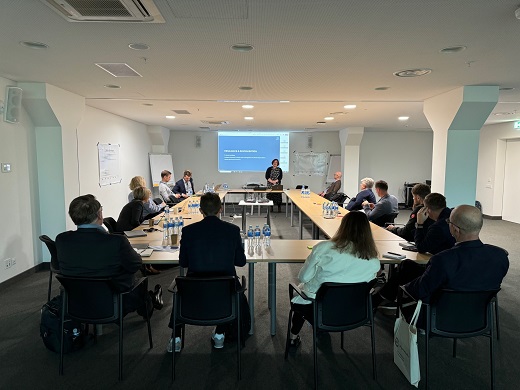Today, the NDPTL Secretariat co-organised a launch event and workshop on Nordic & Baltic Sea region Public-Private Platform on Triple (Digital, Green & Resilient) Transition in Logistics in Vilnius, Lithuania.
With the view of developing a regional roadmap and implementation process, the participants reflected on synergies and interlinkages between the many ongoing processes and emerging standards/technologies around smart, sustainable and resilient logistics within the EU and beyond. The event gathered experts and representatives of national administrations, intergovernmental networks as well as industry and civil society representatives.
After an overview provided by introductory presentations the participants identified possible synergy topics via group work, paving the way for a first draft of a regional roadmap on Triple (Digital, Green & Resilient) Transition in Logistics.
As one possible cooperation instrument to implement such a triple transition roadmap, the project also launched its draft concept for a Nordic & Baltic Sea region Public-Private Platform on such Triple Transition in Logistics.
Based on the foundation provided by the workshop, the work to develop the regional triple transition roadmap and platform concept will continue until the end of the project in December 2024. The finalised proposal will be available for wider regional consideration -and implementation.
IBA-3, the project behind the event, is coordinated by Traficom (FI), implemented by a team consisting of VTT Technical Research Centre of Finland, Vedia and NDPTL Secretariat and funded by the Finnish Ministry of Foreign Affairs for the period October 2023-December 2024.
The IBA-3 project and event are based on the thinking that emission mitigation and resilience of transport systems is vital for the future prosperity of Nordic and EU societies, while the logistics sector is in the middle of a rapid digital transition. Even if this digitalization is mainly driven by hopes for efficiency and economic gains, it also carries great potential to advance also sustainability and resilience.
However, harvesting this synergy potential requires new forms of cross-sectoral and proactive transboundary cooperation involving both governmental, non-governmental and industry actors. Nordic & Baltic regional transboundary cooperation is a perfect context for such a new initiative as it has repeatedly shown its strength as a catalyst between work taking place at the national and EU/Global levels. Such regional work can help the implementation of existing global/EU rules -but also provide new initiatives to help in addressing new global/EU challenges.

